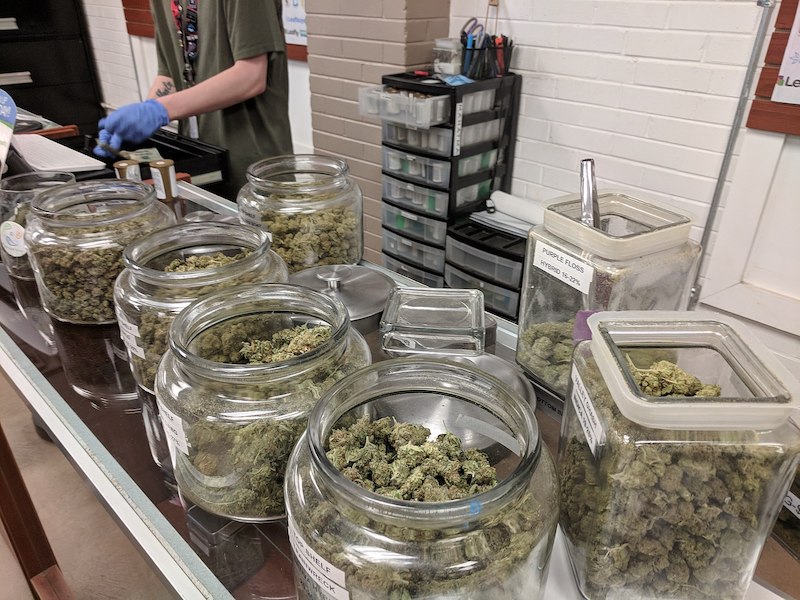Marijuana Stocks Up After Pot Ballot Victories and Sessions’ Firing
Michigan legalized recreational weed, while Missouri and Utah legalized medical use. Recreational marijuana for sale at a dispensary in Denver. (My 420 Tours)
Recreational marijuana for sale at a dispensary in Denver. (My 420 Tours)
Marijuana stocks are up following Jeff Sessions’ firing as attorney general and several state ballot victories. Michigan became the 10th state to legalize recreational marijuana, and Missouri and Utah legalized medical marijuana.
Tilray, a Canadian company, closed up 30 percent. Cronos group added 8.4 percent, Canopy Growth added 8.1 percent and Aurora Cannabis added 9 percent. Experts are also optimistic about the tax revenue that will be generated from legal sales. According to financial services firm Cowen and Co., the U.S. marijuana market could be worth $75 billion by 2030. The legal weed market is expected to hit $11 billion in sales this year.
“Good people don’t smoke marijuana,” Sessions said during a Senate hearing in 2016. In January, he reversed Obama-era guidelines calling for a hands-off approach for states with liberal marijuana laws.
U.S. marijuana stocks up on news of Sessions departure https://t.co/zqh9TpOgX2 pic.twitter.com/ZF1DBEo3we
— Christopher Ingraham (@_cingraham) November 7, 2018
In Michigan, where medical marijuana has been legal since 2008, recreational sales are expected to start in 2020. Individuals will be allowed to grow as many as 12 plants, and current weed-related violations will be changed from crimes to civil infractions. A 10 percent excise tax on retail purchases will go to local government, public education and maintenance of roads and bridges. Tax revenue will also go toward approved academic research on the use of medical marijuana in helping U.S. military veterans, including suicide prevention.
“Legalization of marijuana will end the unnecessary waste of law enforcement resources used to enforce the failed policy of prohibition while generating hundreds of millions of dollars each year for Michigan’s most important needs,” said Josh Hovey, a spokesman for the Coalition to Regulate Marijuana Like Alcohol, which supported the Michigan ballot initiative. Experts estimate that the state’s legal weed industry could reach $1.7 billion.
Thirty-three states have legalized medical marijuana, including Missouri and Utah. In Missouri, voters contended with three different proposals on how taxes on medical marijuana would work. They chose a 4 percent tax that will go toward health care for military veterans. In Utah, smoking marijuana will still be illegal, but patients with such conditions as multiple sclerosis, cancer and HIV will be allowed to vape and consume edibles.
“Even in socially conservative states like Utah, most voters recognize marijuana has significant medical value, and they believe it should be available to patients who could benefit from it,” said Matthew Schweich, deputy director of the Marijuana Policy Project.
Several states rejected weed-related ballot measures, however. In North Dakota, voters decided against legalizing recreational marijuana, and voters in Nebraska rejected a proposal to legalize medical marijuana.
“With Democrats winning the House of Representatives and additional states voting to create medical and recreational cannabis markets, we believe it’s increasingly likely Congress could take action to regulate and tax cannabis at the federal level,” said Isaac Dietrich, CEO of MassRoots, a marijuana-related social network.
Weed is still illegal at the federal level, and it remains to be seen who will become the next attorney general. Matthew Whitaker, who was Sessions’ chief of staff, will take over as acting attorney general.
“Marijuana has now been legalized for adult use in one out of every five states, so I think it’s safe to say federal laws are in need of an update,” said Steve Hawkins, executive director of the Marijuana Policy Project, an advocacy group. “We hope the results of this election will inspire Congress to finally start addressing the tension that exists between state and federal marijuana laws in our nation.”
Your support matters…Independent journalism is under threat and overshadowed by heavily funded mainstream media.
You can help level the playing field. Become a member.
Your tax-deductible contribution keeps us digging beneath the headlines to give you thought-provoking, investigative reporting and analysis that unearths what's really happening- without compromise.
Give today to support our courageous, independent journalists.






You need to be a supporter to comment.
There are currently no responses to this article.
Be the first to respond.